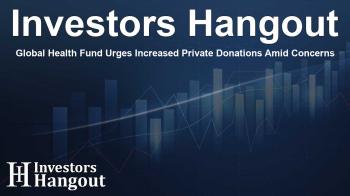Global Health Fund Urges Increased Private Donations Amid Concerns

Global Health Fund's Call for Increased Private Sector Support
One of the largest global health organizations is sounding the alarm regarding the need for increased private sector funding. The Global Fund to Fight AIDS, Tuberculosis and Malaria is preparing to launch a new funding round with a bold request for nearly 50% more financial support from private donors, including philanthropic organizations and corporations. This comes in response to concerns about a potential decrease in government contributions.
The Funding Goal and Context
The Global Fund plans to request a total of $2 billion, aiming to secure essential funds to continue their vital work in combating infectious diseases. Executive Director Peter Sands has indicated that this strategic initiative was set before recent geopolitical developments, specifically the U.S. withdrawal from the World Health Organization (WHO). The necessity for additional financial support has been made glaringly obvious as international aid groups face a more challenging fiscal environment amidst escalating global crises.
Previous Fundraising Success and Future Plans
In the last funding cycle, the Global Fund successfully raised $15.7 billion over three years, which included $1.3 billion from private sector contributors. Notable supporters included the Gates Foundation and major companies like Anglo American and Takeda Pharmaceuticals. This upcoming announcement at the World Economic Forum in Davos signifies a critical moment for the Fund as they prepare to unveil their financial aspirations for the 2027-2029 funding campaign.
Implications of the U.S. Withdrawal
The U.S. has historically been the Fund's largest donor, committing $6 billion in the most recent funding drive. The shifting political landscape, particularly the current administration's decision to withdraw from the WHO, raises new concerns for global health initiatives. Sands emphasized the historical significance of U.S. contributions and the crucial role that the WHO plays in setting health regulations worldwide. The impact of the U.S. withdrawal on global health outreach and initiatives cannot be understated, as it alters the financial and operational dynamics of various health programs.
The Broader Impact on Global Health Organizations
As the Global Fund amplifies its call for private sector investments, other organizations in the global health arena are also actively seeking financial assistance. The vaccine alliance Gavi, for instance, is pursuing $9 billion to enhance vaccination efforts in underserved countries. Acknowledging the strain on government budgets that complicates these efforts, Gavi has committed to fostering a diverse funding foundation and plans to establish a private investor group this year.
The Need for Diverse Funding Sources
Charitable organizations like Gavi and the Global Fund underscore the urgency of addressing potential funding gaps caused by fluctuating government support. The increased competition for limited aid resources, influenced by economic uncertainty and policy changes, prompts organizations to ensure sustainability through wider funding bases. Collaborative efforts between different health entities, as well as a diversified funding strategy will be pivotal in achieving health objectives globally.
In their pursuits, global health organizations are becoming increasingly aware that private sector support is not merely beneficial; it is essential for sustaining their missions in addressing health disparities around the world. The emphasis on collective responsibility, especially among affluent nations and private contributors, lays an important foundation for action and investment in global health.
Frequently Asked Questions
What is the Global Fund to Fight AIDS, Tuberculosis and Malaria?
The Global Fund is an international financing organization that aims to accelerate the end of AIDS, tuberculosis, and malaria as epidemics, by mobilizing and investing funds in various health initiatives worldwide.
Why is there a concern about government funding for global health?
There is growing concern that recent political decisions, such as the U.S. withdrawal from the WHO, may lead to reduced government contributions, which has historically undermined international health efforts.
How much money is the Global Fund seeking in the new funding round?
The Global Fund is aiming to raise $2 billion from private sector donors as part of its latest funding initiative.
What role do private sector donations play in global health funding?
Private sector donations are becoming increasingly critical as governments tighten budgets and funding for health initiatives becomes more competitive and uncertain.
What other organizations are seeking funding alongside the Global Fund?
In addition to the Global Fund, Gavi is actively seeking $9 billion to support vaccination programs in low-income countries, highlighting the collaborative efforts within the global health community.
About Investors Hangout
Investors Hangout is a leading online stock forum for financial discussion and learning, offering a wide range of free tools and resources. It draws in traders of all levels, who exchange market knowledge, investigate trading tactics, and keep an eye on industry developments in real time. Featuring financial articles, stock message boards, quotes, charts, company profiles, and live news updates. Through cooperative learning and a wealth of informational resources, it helps users from novices creating their first portfolios to experts honing their techniques. Join Investors Hangout today: https://investorshangout.com/
Disclaimer: The content of this article is solely for general informational purposes only; it does not represent legal, financial, or investment advice. Investors Hangout does not offer financial advice; the author is not a licensed financial advisor. Consult a qualified advisor before making any financial or investment decisions based on this article. The author's interpretation of publicly available data presented here; as a result, they should not be taken as advice to purchase, sell, or hold any securities mentioned or any other investments. If any of the material offered here is inaccurate, please contact us for corrections.
